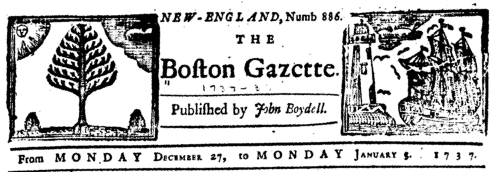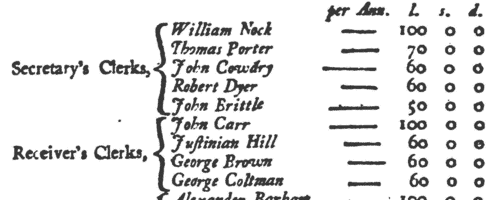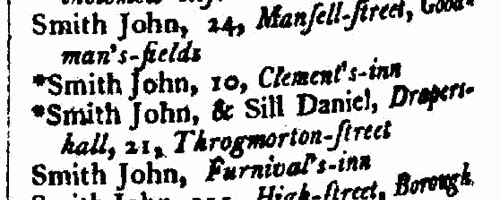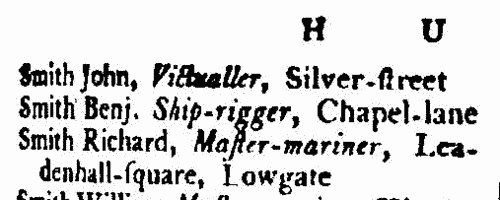Add this eBook to your basket to receive access to all 55 records. Our indexes include entries for the spelling fosse. In the period you have requested, we have the following 55 records (displaying 31 to 40): These sample scans are from the original record. You will get scans of the full pages or articles where the surname you searched for has been found. Your web browser may prevent the sample windows from opening; in this case please change your browser settings to allow pop-up windows from this site.  Masters and Apprentices
(1730) Masters and Apprentices
(1730)
Apprenticeship indentures and clerks' articles were subject to a 6d or 12d per pound stamp duty: the registers of the payments usually give the master's trade, address, and occupation, and the apprentice's father's name and address, as well as details of the date and length of the apprenticeship. 16 March to 31 December 1730. | Sample scan, click to enlarge

|  Apprentices registered at Exeter in Devon
(1728-1731) Apprentices registered at Exeter in Devon
(1728-1731)
Apprenticeship indentures and clerks' articles were subject to a 6d or 12d per pound stamp duty: the registers of the payments usually give the master's trade, address, and occupation, and the apprentice's father's name and address, as well as details of the date and length of the apprenticeship. There are central registers for collections of the stamp duty in London, as well as returns from collectors in the provinces. These collectors generally received duty just from their own county, but sometimes from further afield. (The sample entry shown on this scan is taken from a Norfolk return) | Sample scan, click to enlarge

| Masters of Slaves in Antigua (1737)
The Boston Gazette in New England reported the executions of slaves after an uprising in Antigua, giving the names of their masters.
| Sample scan, click to enlarge

| Custom House Officials
(1741)
'A General List, or Catalogue, Of all the Offices and Officers Employ'd In the several Branches of his Majesty's Government Ecclesiastical, Civil, Military, &c. In South-Britain, or England' gives the names (and often the annual salaries) of the government functionaries, civil servants, churchmen and military, systematically arranged section by section. Section 25(a) lists the commissioners, officers and others belonging to the Custom House, including the customs officers of the Port of London, at the out-ports of Sandwich, Chichester, Southampton, Poole, Plymouth, Exeter, Gloucester, Bristol, Bridgwater, Cardiff and Swansea, Milford, Ipswich, Yarmouth, Lynn, Boston, Hull, Newcastle, Berwick, Carlisle and Chester; and officers appointed by the commissioners at Rochester, Faversham, Sandwich, Deal, Dover, Rye, Shoreham, Arundel, Newhaven, Chichester, Portsmouth, Southampton, Poole, Cowes, Weymouth, Lyme, Exeter, Dartmouth, Plymouth, Looe, Fowey, Falmouth, Penryn, Truro, Penzance, St Ives, Padstow, Biddeford, Barnstaple, Ilfracombe, Minehead, Bridgwater, Bristol, Gloucester, Chepstow, Cardiff, Swansea, Milford, Llanelly, Cardigan, Aberdovey, Maldon, Colchester, Harwich, Woodbridge, Aldeburgh, Southwold, Ipswich, Yarmouth, Blakeney and Cley, Wells, Lynn, Wisbech, Boston, Hull, Bridlington, Scarborough, Whitby, Stockton, Sunderland, Newcastle, Berwick, Carlisle, Whitehaven, Lancaster, Preston and Poulton, Liverpool, Chester and Beaumaris; and in the Plantations at Carolina and the Bahamas, South Carolina, North Carolina, Roanoake, Brunswick, Virginia, Maryland, Pennsylvania, East Jersey, New York, Connecticut, New England, Bahamas, and Barbados. | Sample scan, click to enlarge

| Nottinghamshire Marriage Licences
(1701-1753)
Nottingham Archdeaconry, which was almost coextensive with the county of Nottingham, lay in the diocese and province of York, but it had substantially independent jurisdiction for both probate and the issuing of marriage licences. These are abstracts of the archdeaconry marriage licences: they usually state the groom's address, occupation, age, and condition; the bride's address, age and condition; and the names of the churches or parishes at which it was intended the marriage would be celebrated. Not all licences led to marriages. Where the age given is 21, it should be construed as '21 or over'. There was no obligation for the marriage to take place at the parish suggested, but the licence would only be valid within the county. These abstracts have been annotated with extra information found on the marriage bonds. 26 Nottinghamshire parishes (Beckingham, Darlton, Dunham, Eaton, North Leverton, Ragnall, Rampton, South Wheatley, Cropwell Bishop, Bleasby, Blidworth, Calverton, Caunton, Edingley, Farnsfield, Halloughton, Holme, Kirklington, Morton, North Muskham, Norwell, Oxton, South Muskham, Southwell, Upton and Woodborough) lay within the small peculiar jurisdiction of Southwell, which issued its own licences: abstracts of these for the period 1755 to 1833 are also included here. | Sample scan, click to enlarge

|  Masters and Apprentices
(1754) Masters and Apprentices
(1754)
Apprenticeship indentures and clerks' articles were subject to a 6d or 12d per pound stamp duty: the registers of the payments usually give the master's trade, address, and occupation, and the apprentice's father's name and address, as well as details of the date and length of the apprenticeship. 1 January to 4 July 1754. | Sample scan, click to enlarge

| Tradesmen of York
(1559-1759)
No man or woman could trade in the city of York without having obtained 'freedom' of the city. Their names were recorded on the 'Freemen's Roll', or Register of the Freemen of the City of York, which contains about 16,600 names for this period. A list of names was prepared for each year. Each annual list starts with the name of the mayor and the camerarii or chamberlains. The chamberlains were freemen charged with the duty of receiving the fees of the new freemen; of seeing that only freemen traded in the city; and of preparing this roll, which was compiled from the names on their own account books from the receipts for the fees. There are three groups of freemen: those who obtained freedom after serving out an apprenticeship to a freeman; the children of freemen (per patres); and a handful who claimed freedom by 'redemption', i. e. by purchase or gift from the Mayor and Court of Aldermen.
| Sample scan, click to enlarge

| London Attorneys
(1791)
A list of attorneys residing in London, Westminster, the borough of Southwark and their environs, from the Universal British Directory. Those without a mark before the name practised in the King's Bench; those with a (C) in the Common Pleas; and those with a * in both courts. | Sample scan, click to enlarge

|  Apprentices registered in Devon
(1795) Apprentices registered in Devon
(1795)
Apprenticeship indentures and clerks' articles were subject to a 6d or 12d per pound stamp duty: the registers of the payments usually give the master's trade, address, and occupation, and the apprentice's name, as well as details of the date and length of the apprenticeship. There are central registers for collections of the stamp duty in London, as well as returns from collectors in the provinces. These collectors generally received duty just from their own county, but sometimes from further afield. The indentures themselves can date from a year or two earlier than this return. (The sample entry shown on this scan is taken from a Bristol return. Each entry has two scans, the other being the facing page with the details of the indenture, length of service, and payment of duty.) IR 1/67 | Sample scan, click to enlarge

| Inhabitants of Exeter in Devon
(1790-1797)
The provincial sections of the Universal British Directory include lists of gentry and traders from each town and the surrounding countryside, with names of local surgeons, lawyers, postmasters, carriers, &c. (the sample scan here is from the section for Hull). The directory started publication in 1791, but was not completed for some years, and the provincial lists, sent in by local agents, can date back as early as 1790 and as late as 1797.
| Sample scan, click to enlarge

|
Research your ancestry, family history, genealogy and one-name study by direct access to original records and archives indexed by surname.
|












